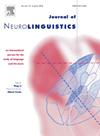Lexical-semantic activation in French-Spanish or French-English bilingual toddlers: An event-related potential (ERP) investigation
Abstract
Both behavioral and neurophysiological evidence shows that lexical-semantic organization emerges by two years in monolingual children. Research in bilingual children is more scarce, and there is only a limited amount of neurophysiological evidence of the effect of language dominance on lexical-semantic activation. In the present event-related potential (ERP) study, we investigated whether bilingual French-Spanish and French-English learning 24- to 30-month-olds activate semantic relations between words similarly in their both languages, and whether the priming effects are similar in children learning two different language pairs. Participants were presented with related and unrelated dominant and non-dominant language word pairs in a within-language lexical-semantic priming paradigm. The amplitudes of N400 were modulated by trial type, language dominance and language group. A language-independent priming effect - more pronounced N400 amplitudes for unrelated than for related target words - was found in the group of toddlers learning French and Spanish. In the group of toddlers learning French and English, a priming effect was observed only in their non-dominant language. Our results propose that the language pair may contribute to lexical-semantic facilitation in priming tasks during early childhood.

 求助内容:
求助内容: 应助结果提醒方式:
应助结果提醒方式:


